NEWS
From the beginning to today
HIGHLIGHTS
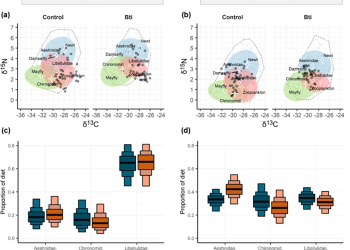
05 July 2024
A new publication from Dr. Verena Gerstle and co-authors analyzes the effect of the mosquito biocide Bacillus thuringiensis var. israelensis (Bti) on the trophic predator-prey dynamics of newts and dragonflies in pond ecosystems. The study found no effects of Bti on the diet proportions of newt larvae and no significant effects on their fatty acid content. However, the authors observed a trend in the larvae of the dragonfly Aeshnidae: in ponds exposed to Bti, compared to controls, they consumed a higher proportion of large prey (e.g., Aeshnidae, newt, and damselfly larvae). Link to the study
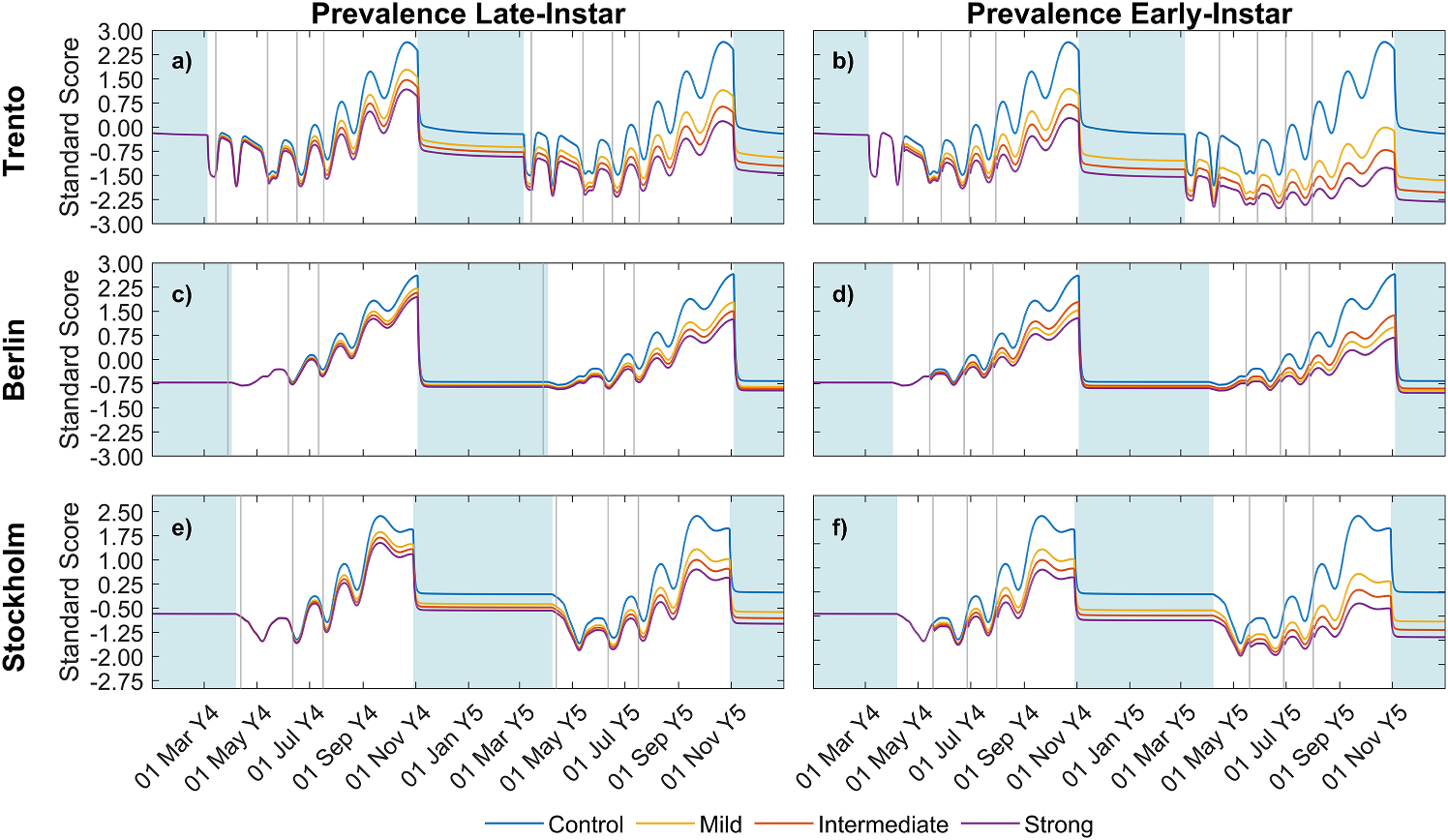
21 June 2024
In their recent paper, Dr. Alessandro Manfrin, Dr. Gregorio López Moreira Mazacotte, and co-authors developed a model to predict the long-term cumulative effects of toxicant exposure on the emergence of Chironomidae for multiple generations and across European latitudes. The emergence reduction was stronger with prevalence of early-instar larvae and twice as severe in the 2nd year of Bti application. The model is flexible and can be tuned and applied to different pollutants, scenarios, systems and functional or taxonomic units. Link to the paper
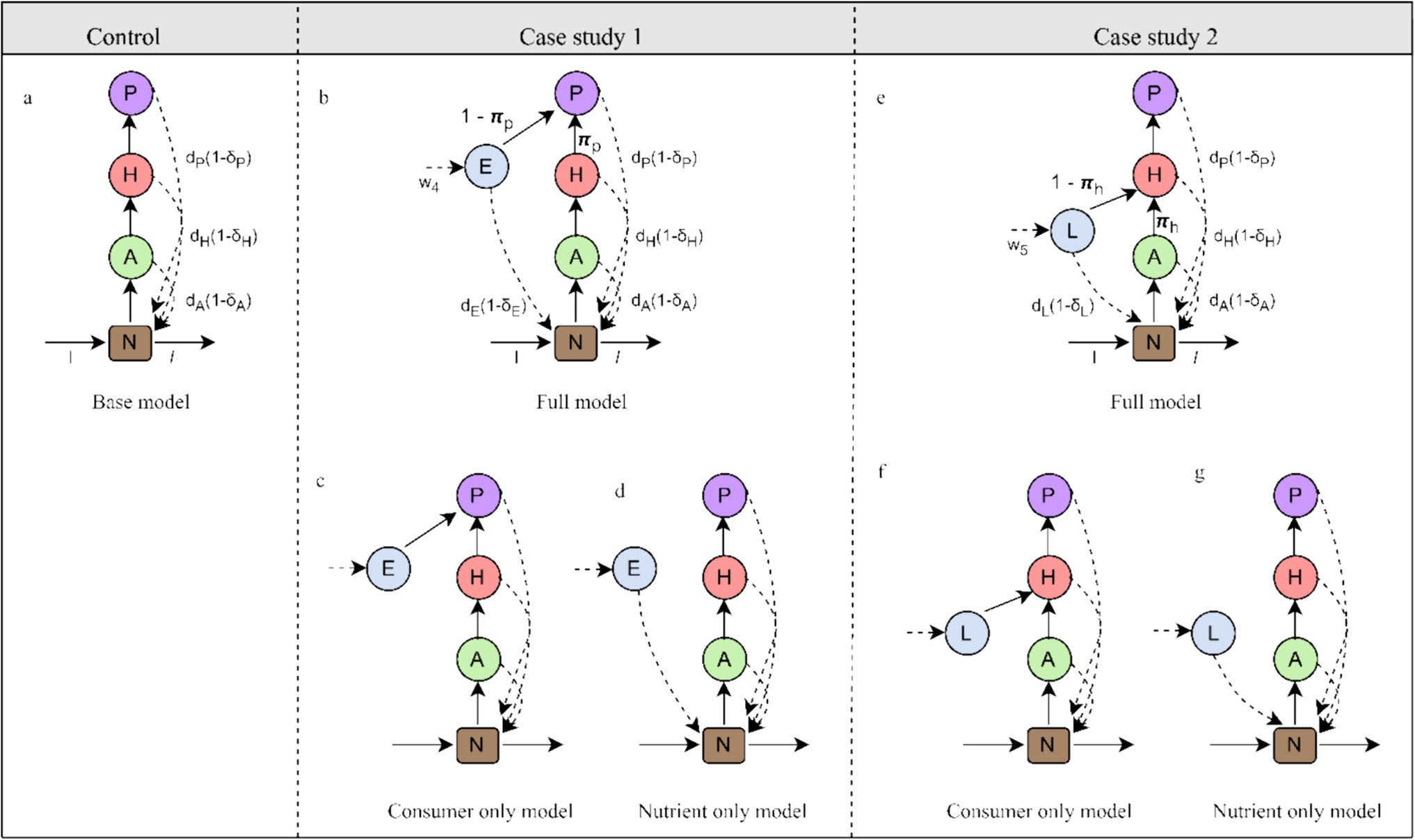
15 June 2024
In this new paper, former doctoral researcher Dr. Stephen E. Osakpolor, and co-authors developed a series of models to predict relative and interactive effects between consumption and recycling subsidy coupling pathways on the biomass and functions of a recipient ecosystem. This study suggests that future empirical and theoretical research on subsidies should consider various coupling pathways to provide a more mechanistic understanding of their effects. Link to the paper
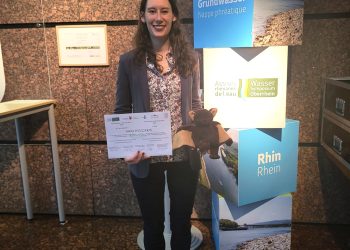
23 March 2024
Dr Maike Huszarik was awarded second place for her dissertation at the Wassersymposium Oberrhein 2024, which honoured the three best dissertations on topics relating to water in the Upper Rhine region, sustainable water management, environmental quality, design, renaturation or the protection of water ecosystems in the Upper Rhine region.
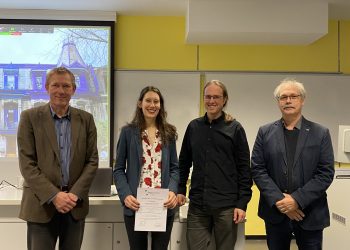
15 November 2023
SystemLink PhD candidate Maike Huszarik successfully defended her doctoral thesis. We congratulate her on this great success.
Maike completed her dissertation on the topic “Indirect effects of chemical stream pollution on the riparian food web.”
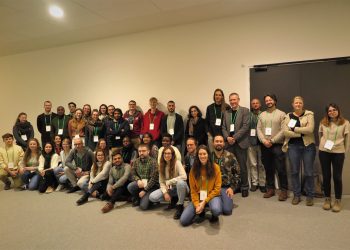
08 November 2023
DFG funds second phase of Research Training Group with around 6.6 million euros! SystemLink has beeen extended for another 4.5 years and a third cohort of doctoral researchers. Link to press release (in German).

02 November 2023
Vicoria Sophie Stoll wins the university prize for the best master thesis with a regional focus.
She investigated the effects of the mosquito repellent Bti, which is used in the Rhine floodplains and elsewhere, on the diversity and composition of mosquito communities. Link to press release (in German)
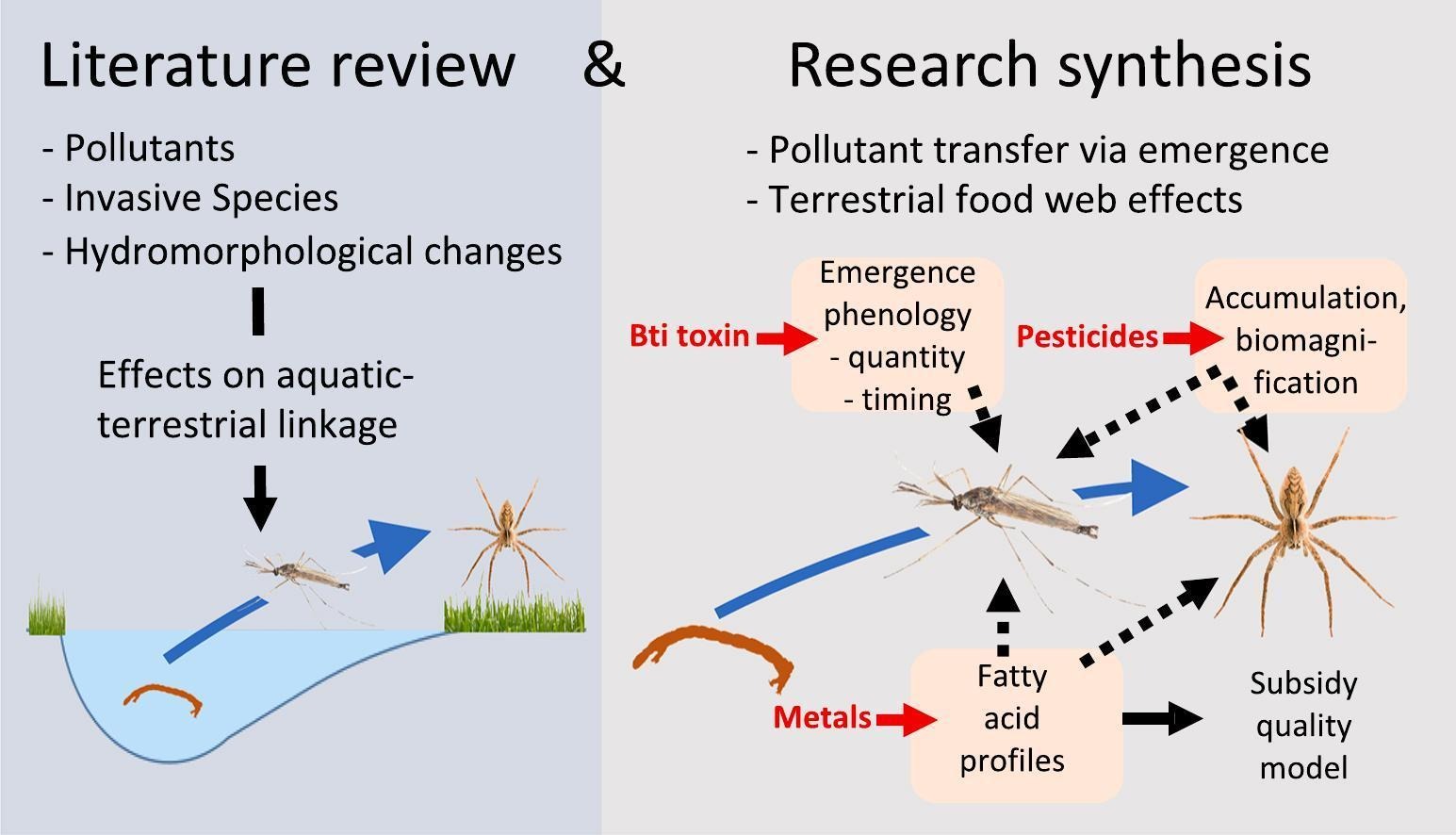
07 November 2023
A new paper by Ralf Schulz and the PI’s of the Research Training group on how anthropogenic stressors can affect aquatic-terrestrial linkages and food webs with special focus on pollutants. Link to the paper
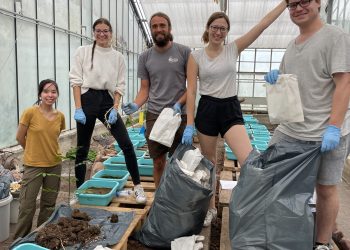
18 September 2023
After 1/2 a year of work, we have finished our large interdisciplinary SystemLink pot experiment in the greenhouse of Kaiserslautern campus.
Next step: genetic, chemical & ecotox. analyses. Many thanks to all helpers
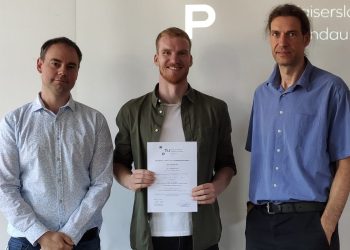
07 July 2023
SystemLink PhD student Sebastian Pietz successfully defended his doctoral thesis. We congratulate him on this great success.
Sebastian completed his dissertation on the topic “Aquatic contaminants reduce the quantity and nutritonal quality of aquatic subsidy to riparian consumers.”
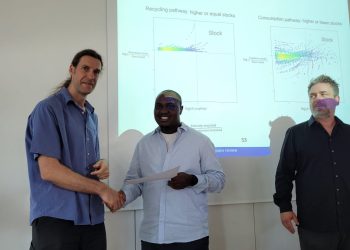
14 June 2023
SystemLink PhD student Stephen Osakpolor successfully defended his doctoral thesis. We congratulate him on this great success.
Stephen completed his dissertation on the topic “Modelling the response of a terrestrial food web to a change in aquatic subsidies through environmental stress.”
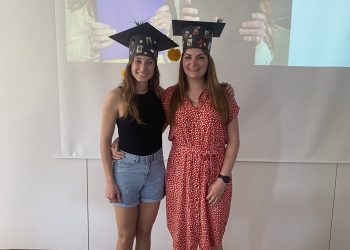
12 June 2023
SystemLink PhD students Sara Kolbenschlag and Verena Gerstle successfully defended their doctoral thesis. We congratulate both of them on this great success.
Both doctoral students investigated the impact of Bti on food webs in the ponds of the Eußerthal Ecosystem Research Facility.
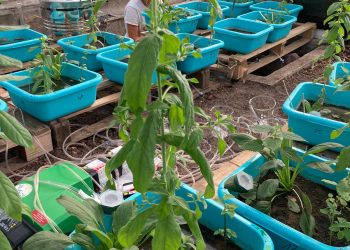
06 June 2023
Today we flooded the pots of the Joint Pot Experiment (JointPE) in the greenhouses of the Kaiserslautern campus. We are curious to see how the food web of the riparian habitat will cope with this stressor.
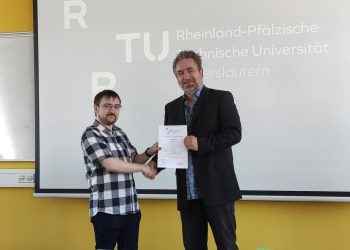
26 May 2023
SystemLink PhD student Daniel Schmitz successfully defended his doctoral thesis. We congratulate him on this great success.
Daniel Schmitz completed his dissertation on the topic “The effects of soil copper contamination and invasive plants on soil properties, microbial communities and plant growth in riparian habitats.”
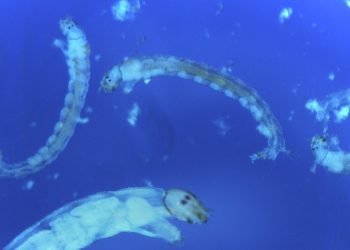
22 May 2023
Non-biting midges are key organisms in merolimnic systems, however they are very challenging to identify and usually extremely abundant in bulk samples.
In this study the authors developed a framework, integrating morphological and molecular techniques, to identify more than 90% of species diversity present in a sample by processing less than 10% of the sample content.
This approach can drastically reduce the processing workload of non-biting midges and improve their assessment in ecological studies.
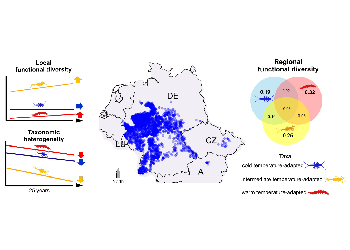
19 May 2023
This study led by Alessandro Manfrin shows that over recent decades, small low-mountain streams in Central Europe have experienced a process of thermophilization and increasing functional diversity at local scales. However, a progressive homo-genisation occurred at the regional scale, with communities converging towards similar taxonomic composition.
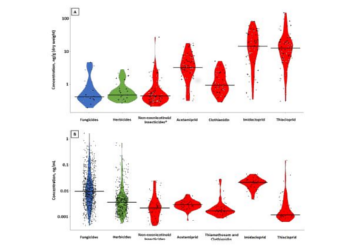
12 May 2023
In this study by SystemLink PhD student Alexis Pieter Roodt and colleagues, published in the Journal of Hazardous Materials, 82 organic pesticides were measured in water, emerging insects and riparian spiders. It was shown that neonicotinoids had the highest concentrations in emerging insects, although their concentrations in water were low.
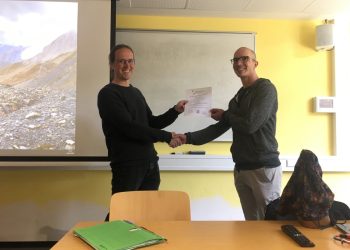
26 April 2023
SystemLink PhD student Alexis Pieter Roodt successfully defended his doctoral thesis. We congratulate him on this great success.
Alexis Pieter Roodt completed his dissertation on the topic “Implications of physicochemical properties of micropollutants for their emergence-mediated transport to terrestrial ecosystem.”
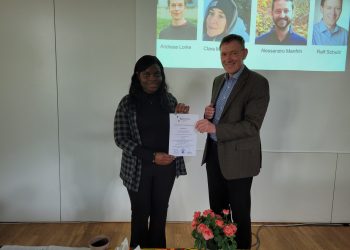
26 April 2023
SystemLink PhD student Caroline Ganglo successfully defended her doctoral thesis. We congratulate her on this great success.
Caroline Ganglo completed her dissertation on the topic “Effects of chemical stressors on biogeochemical processes and fluxes in water to land transition zones.”
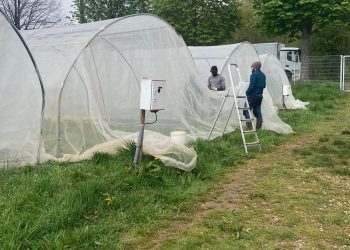
21 April 2023
Riparian Stream Mesocosm facility is almost ready. Yesterday, the nets were pulled onto the tunnels. The side panels will remain open for a while so that the organisms can continue to colonise all the areas.
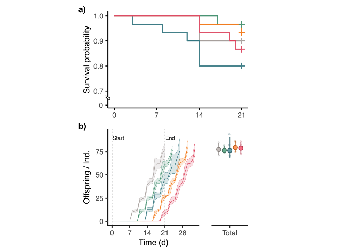
14 April 2023
Stable isotope analysis is an eminent tool to understand ecosystems and food webs. Eric Bollinger and colleagues assessed whether labeling with heavy stable isotopes affect in situ conditions in autotrophy-based and detritus-based trophic links.
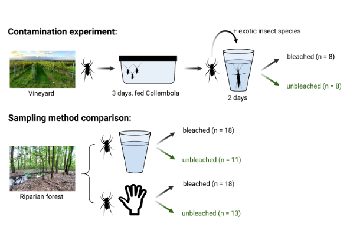
28 March 2023
SystemLink PhD student Maike Huszarik published a a study on External DNA contamination and efficiency of bleach decontamination for arthropod diet analysis in Environmental DNA.
In this study, Huszarik and colleagues confirm that DNA meta-barcoding can be used together with bleaching for spiders sampled from pitfall traps, and that hand sampling does not necessarily exclude external DNA.
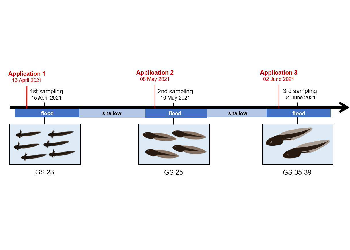
24 March 2023
SystemLink PhD student Verena Gerstle and colleagues exposed tadpoles of the European common frog (Rana temporaria) to field-relevant doses of the mosquito control biocide Bacillus thuringiensis var. israelensis (Bti) in outdoor floodplain pond mesocosms (FPM) under natural environmental conditions.
In this study, published in Bulletin of Environmental Contamination and Toxicology, Gerstle and colleagues did not measure on the tadpoles any oxidative stress due to the application of Bti
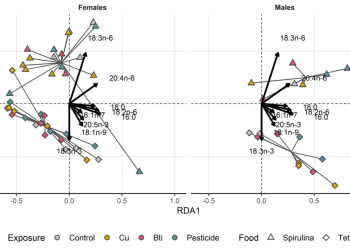
22 March 2023
In this study by SystemLink PhD student Sebastian Pietz and colleagues, published in Environmental Toxicology, aquatic contaminants, namely copper (Cu), the mosquito biocide Bacillus thuringiensis var. israelensis (Bti) and a mixture of synthetic pesticides, had negligible effects on the non-biting midges adult fatty acid profile.
On the other hand, the content of physiologically important polyunsaturated fatty acids in the web spider Tetragnatha, known to feed on non-biting midges adults, was reduced by ~30% in Cu and Bti treatments, likely resulting in the observed decline in spider growth.
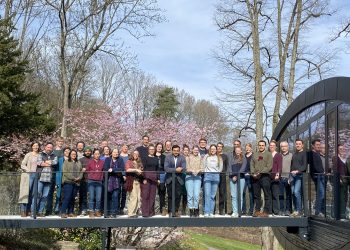
18 March 2023
We finished a great and work-intensive research workshop at the Jugendstilhotel Triefels in Annweiler. 1.5 work-intensive days where the PhD students presented their research plans for their projects. We discussed contents and clarified open questions. In addition, we took another look at the joint experiments for the upcoming field season.
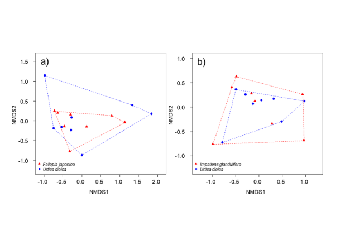
16 March 2023
In this study, published in Biological invasions, Daniel Schmitz and colleagues investigated the impact of Fallopia japonica and Impatiens glandulifera on abiotic and biotic soil properties, with a special focus
on fungi.
They were able to show that F. japonica and I. glandulifera can influence the abundance of soil arthropods and are
characterized by lower Operational Toxic Unit richness of root-associ-
ated fungi.
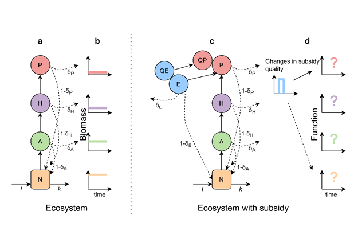
03 March 2023
In this study, published in Ecology, Stephen E. Osakpolor and colleagues contribute to fill the gap of the currently lack of models to predict the effects of changes in subsidy quality on recipient ecosystem functioning.
Osakpolor and colleagues developed here a model to predict the effects of subsidy quality, as PUFA concentration in aquatic subsidies, on dynamics in biomass stocks and functions of recipient riparian ecosystems. Model predictions showed that subsidy quality increases the functioning of the recipient ecosystem.
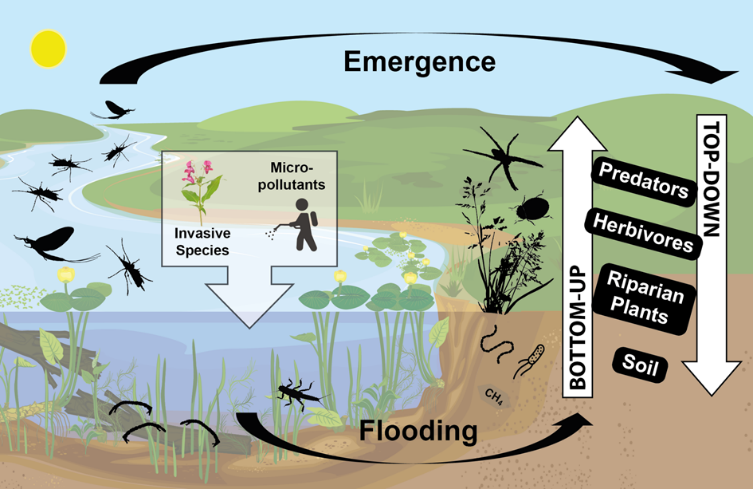
03 March 2023
Anthropogenic impacts in aquatic ecosystems, such as micropollutants, invasive species, or altered hydrological regimes, can propagate to riparian ecosystems via abiotic and biotic pathways.
The goal of the interdisciplinary research training group SystemLink, funded by the German Research Foundation (DFG), is to investigate how anthropogenic stressors on aquatic ecosystems affect ecological and biogeochemical processes in adjacent terrestrial ecosystems.
Interested scientists are welcome to join our research team and to use the associated facilities for their own experiments or analytical approaches.
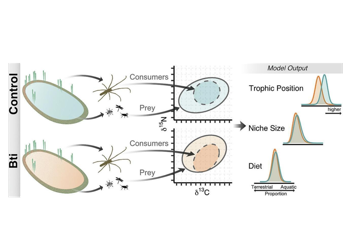
21 February 2023
Adult aquatic insects such as non-biting midges (Chironomidae), can be important prey for riparian spiders. Previous studies showed that the mosquito control agent Bacillus thuringiensis var. israelensis altered Chironomidae emergence dynamics.
In this study, published in Science of the Total Environment, SystemLink PhD student Sara Kolbenschlag and colleagues report that spiders collected in terrestrial areas adjacent to ponds treated with Bti fed more on terrestrial prey and other aquatic organisms than Chironomidae compared to spiders collect in proximity of ponds not treated with Bti.
The spider higher consumption of aquatic and terrestrial primary consumers than predaceous Chironomidae in proximity of Bti-treated ponds, potentially explains the spider lower trophic position.
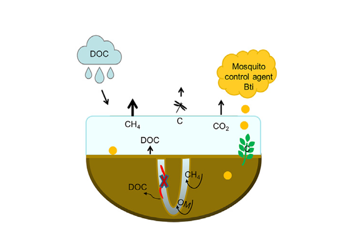
29 January 2023
Shallow lentic aquatic ecosystems, such as ponds, are hotspots of C cycling and contribute significantly to the global greenhouse gas emission to the atmosphere.
In this study, published in Science of the Total Environment, SystemLink PhD student Caroline Ganglo and co-authors investigated if the C-budget in ponds can be altered by the use of the mosquito biocide (Bti). Findings suggest that, except for a trend towards less dissolved organic C in porewater, Bti- treated ponds showed no effect for C-fluxes to the atmosphere, C-pools, and C-transformation.
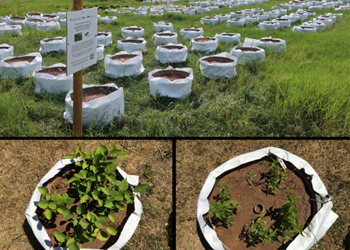
19 January 2023
Copper accumulating in stream sediments can be transported to adjacent riparian habitats by flooding. Invasive plant such as Fallopia japonica, are known to be more tolerant toward heavy metals than native species such as Urtica dioica.
In a fully replicated pot study, published in Plants, Daniel Schmitz and colleagues showed that F. japonica might be able to more efficiently detoxify internal copper concentrations compared to the native species. This could give F. japonica a competitive advantage facilitating its invasion success.
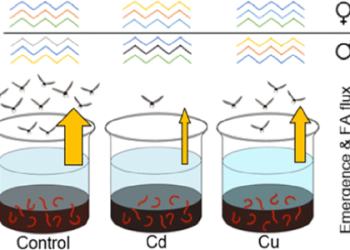
17 January 2023
Aquatic micropollutants such as metals, can be transported to terrestrial systems and their consumers by subsidy fluxes of emergent aquatic insects. At the same time, micropollutants, may also affect the quantity and quality of the flux of physiologically important polyunsaturated fatty acids (PUFAs), associated with the aquatic insect subsidies that are transported to terrestrial food webs.
In this study, published in Environmental Science and Technology, SystemLink PhD student Sebastian Pietz and colleagues found that metals Cd and Cu significantly reduced aquatic insect emergence up to 95% for Cd causing a decline in the total fatty acid flux to the terrestrial system by ∼80%.
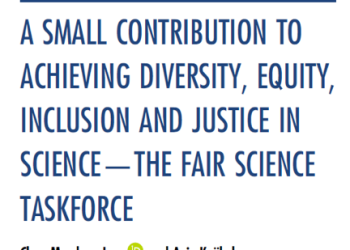
08 January 2023
Clara Mendoza-Lera and Anja Knäbel shed the light on Research-Oriented Equity and Diversity Standards (REDS): developing a “Fair Science” and the Fair Science taskforce.
The interdisciplinary research training group SystemLink, funded by the German Research Foundation (DFG) is composed of over 40 doctoral candidates and researchers from numerous countries, cultural backgrounds, and gender identities. One of the project goals, as required by REDS, is to promote gender balance within our project members and beyond. When developing the guidelines of the taskforce participants that would work on this project a few questions came up given that underrepresentation goes beyond gender.
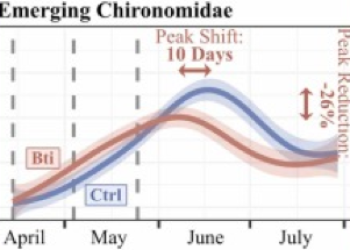
05 January 2023
The mosquito control agent Bacillus thuringiensis var. israelensis (Bti) has been found to cause adverse effects on non-target dipterans, especially on non-biting midges larvae (Chironomidae), in a number of laboratory and (semi-)field studies.
In this study, published in Ecotoxicology and Environmental Safety, SystemLink PhD student Sara Kolbenschlag and colleagues tested the effect of Bti on emerging aquatic insect dynamics in a replicated field study using twelve artificial floodplain pond mesocosms.
Bti altered community compositions over the entire study duration – an effect mainly attributed to an earlier (∼10 days) and reduced (∼26%) peak in the emergence of Chironomidae.
